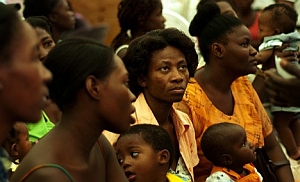A foundation in the Netherlands reports that developing areas of the world have more access to drugs from the top 20 pharmaceutical companies than two years ago. The Access to Medicine Foundation that publishes a bi-annual index of drug access in developing regions says GlaxoSmithKline repeats in 2012 as the leading company in making its drugs available.
The foundation’s Access to Medicine Index offers ratings of the leading pharmaceutical companies in their delivery of needed drugs to people in developing countries who lack reliable access to safe, effective and affordable medicines, vaccines, and other health care technologies. This year’s index, released yesterday, scores the industry overall and ranks the 20 largest pharmaceutical companies on their performance.
The industry overall, says the report, are developing more products for more diseases that affect the world’s poor, and collaborating more in the process than they were two years ago. The top drug companies now devote as much as 20 percent of their pipelines to products that address the needs of the poor. Examples cites are a leishmaniasis drug by Sanofi that can be applied to the skin at home rather than by a health worker’s injection, and a simple, portable screening test for tuberculosis developed in collaboration with Johnson & Johnson.
More companies, says the report, are using tiered pricing schemes to lower prices for certain countries or population groups within a country, and applying them to a broader range of products and in more countries. The report called for expanding these tiered pricing schemes.
The index points out as a continuing major problem is the lack of transparency in the use contract research organizations for clinical trials in developing regions. None of the companies in the index, says the foundation, gives full details about the contracted research groups they hire, which can help increase the accountability of the pharmaceutical companies for the conduct of those trials. The report, however, highlights the work of Merck, Sanofi, GlaxoSmithKline, and Eisai in enforcing codes of conduct with their contracted research organizations.
Other problems that still need attention by the companies are more transparency about lobbying practices, adapting packaging to local needs, making drug donations more needs-based, and allowing clinical trial data to be used to accelerate the approval of generic medicines in developing countries.
As in 2010, GlaxoSmithKline emerged as the leading pharmaceutical company in making its drugs available to developing regions. Johnson & Johnson and Sanofi ranked in close second and third place behind GSK. The foundation says 17 of the 20 companies performed better on the index than in 2010, with more companies grouped closer to the top in overall scores than two years ago. The Japanese companies Takeda, Daiichi Sankyo, and Astellas ranked at the bottom of the group.
The index scores the pharmaceutical companies on 100 factors grouped into seven sets of indicators: management, public policies, research and development, pricing, patents, capability, and donations. The investment research company MSCI in New York generated the index for the Access to Medicine Foundation, with input from the foundation’s funders — Bill and Melinda Gates Foundation, Dutch Ministry of Foreign Affairs, the U.K. Department for International Development, and several charitable organizations.
Read more:
- Pharmas to Collaborate on Improving Clinical Trial Process
- PhRMA Company R&D Investment Flat in 2011
- Pharmas, Foundations, Agencies Partner on Tropical Diseases
- Private-Public Consortium to Share IP on Tropical Diseases
* * *


 RSS - Posts
RSS - Posts
[…] Report: Pharmas Increasing Medicine Access in Poor Regions […]